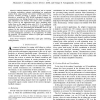Free Online Productivity Tools
i2Speak
i2Symbol
i2OCR
iTex2Img
iWeb2Print
iWeb2Shot
i2Type
iPdf2Split
iPdf2Merge
i2Bopomofo
i2Arabic
i2Style
i2Image
i2PDF
iLatex2Rtf
Sci2ools
119
click to vote
TCOM
2010
2010
Variable-rate M-PSK communications without channel amplitude estimation
—Channel estimation at the receiver side is essential to adaptive modulation schemes, prohibiting low complexity systems from using variable rate and/or variable power transmissions. Towards providing a solution to this problem, we introduce a variable-rate (VR) M-PSK modulation scheme, for communications over fading channels, in the absence of channel gain estimation at the receiver. The choice of the constellation size is based on the signal-plus-noise (S+N) sampling value rather than on the signal-to-noise ratio (S/N). It is analytically shown that S+N can serve as an attractive simpler criterion, alternative to S/N, for determining the modulation order in VR systems. In this way, low complexity transceivers can use VR transmissions in order to increase their spectral efficiency under an error performance constraint. As an application, we utilize the proposed VR modulation scheme in equal gain combining (EGC) diversity receivers.
| Added | 30 Jan 2011 |
| Updated | 30 Jan 2011 |
| Type | Journal |
| Year | 2010 |
| Where | TCOM |
| Authors | Athanasios S. Lioumpas, George K. Karagiannidis |
Comments (0)

